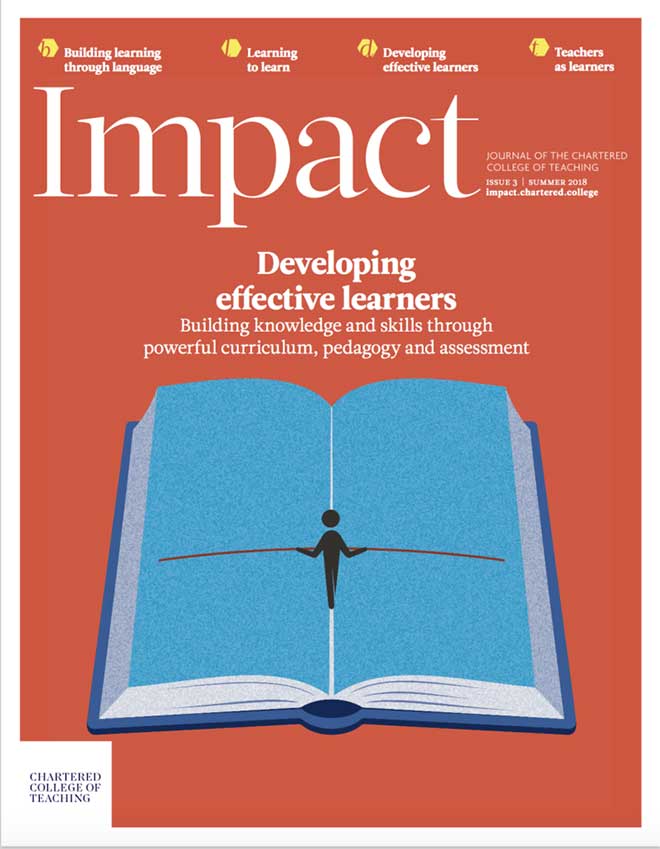
The breakthrough in my thinking about the curriculum came when I tried to answer the question that I now think every generation should ask: ‘what are schools for?’ (Young, 2011). I was deeply dissatisfied with most of the answers that my discipline, the sociology of education, gave; they were almost invariably trapped by one kind […]

The last 6 years has been a developmental curriculum journey at Victoria Academies Trust. We progressed from creating a new and innovative approach to learning within a single academy, to using the developed approach to undertake school improvement for schools in special measures. Originally designed by a team of senior and middle leaders within Victoria […]

“Is there a profession filled with more disagreement among its members than teaching?” This was a question posed on Twitter by lecturer in education at La Trobe University Emina McLean in October (twitter.com/EminaMcLean/status/1178879273127403520). Why, she mused, is there furious disagreement about such fundamental aspects of our profession as teaching reading, managing behaviour, assessment, inclusion, pedagogy […]

In 2017, the Department for Education published a report that examined the progress of evidenced-informed teaching in England. The findings suggest that despite limited direct application of research in teachers’ practice, evidence was valued and did inform teacher thinking (Coldwell et al., 2017). Alongside this report, there were other developments that showed that evidence-informed teaching […]

Cognitive load theory (CLT) (Sweller, 1998) is a well-established framework that has attracted renewed attention due to its evidential role in the new Ofsted ‘Education inspection framework’ (Ofsted, 2019). CLT concerns the architecture of memory – how the brain processes and stores information. All conscious processing occurs in the working memory, which has limited capacity, […]

The Religious Education Council has warned that without good religious education (RE) teachers, religious discrimination could rise. Yet, 2017–18 saw a third of training places for initial teacher training in RE unfilled (Sellgren, 2018). This is perhaps symptomatic of one of the deeper problems with RE: a lack of clarity about the purpose, disciplinary methods […]

At Egerton primary school, we viewed the release of the new curriculum in 2014 as the perfect time to review our vision, curriculum design and learning culture. Governors and all stakeholders were involved in the development of the vision: Through dynamic teaching, a highly creative curriculum and supportive environment, every Egerton child gains a passion for learning. When combined with the knowledge, […]

Developments in our understanding of how three- to seven-year-olds learn mathematics have practical relevance for the mathematics we plan for in nursery, Reception and Year 1 settings. They also bring into question the current weight being attached to number and recall over other areas of mathematics in the proposed changes to the Early Learning Goals […]

Religious education (RE) has been described as ‘an uneasy coalition of several disciplines in undisciplined competition with each other’ (Chater and Erricker, 2012). It has been criticised in recent years for a lack of clear purpose, for confused and confusing curriculum design, and for a student experience identifiable by its lack of parity across the […]

The aim of our CPD packs is to support members in further exploring the themes raised in an issue of our journal, Impact. CPD packs provide guidance and resources to help facilitate staff CPD based on key articles from each issue. This pack is related to the following articles: ‘What is a ‘knowledge-rich’ curriculum?‘, written by […]

Hembree’s (1988) large and heavily cited meta-analysis of 562 studies about test anxiety found that test anxiety affects girls more than boys and can start at the ages of seven to eight years (Year 3 to Year 4). Test anxiety is a transactional construct that affects performance of working memory. One aspect of Bandura’s self-efficacy […]

The context of modern languages teaching It is easy to argue that modern language teaching in English-speaking countries is in crisis. In England, the supply of advanced-level linguists has dwindled rapidly since the 1990s, university language departments have closed and less than half of all secondary students take a language at GCSE (Tinsley and Doležal, […]

Retrieval practice is strongly supported by over 100 years of research and is one of only two learning techniques rated by Dunlosky et al. (2013) as having ‘high utility’ for classroom practice. It is also widely used in classrooms across England. So, is it even worth evaluating? Surely we already know that retrieval practice works? […]

Long before the current Chief Inspector for Schools, Amanda Spielman, emphasised the importance of a broad and balanced curriculum, the Cambridge Primary Review (CPR) (Alexander, 2010) recommended that the primary curriculum reflect schools’ contexts and communities – that it should be designed carefully and with consideration of its local setting. The University of Cambridge Primary […]

Designing a new curriculum involves striking a crucial balance between subject knowledge, core skills and how children actually learn. In our Hackney primary school, that is precisely what we are doing, along with developing teacher’s understanding and application of cognitive science so that we are building ‘a school within a school’. Excellence for Students To attempt to achieve this balance, we decided to […]

This issue discusses the development of knowledge and skills through powerful curriculum, pedagogy and assessment, with sections on: building learning through language learning to learn developing effective learners teachers as learners.

An important point in the establishment of a new secondary school is the making of its curriculum. In 2013, XP School, Doncaster, invited researchers from Sheffield Hallam University (joined in 2016 by Auckland University) to work with its teachers, involving school visits, sharing of curriculum plans and curriculum evaluation. This paper describes the research-informed outcomes […]

‘Reading is boring’ – a comment that I have heard numerous times from a variety of students, and a concept that I find incredibly difficult to comprehend, especially as a voracious reader myself. This receptive skill is an integral part of daily life and, as an English as an additional language (EAL) teacher, I […]

‘It is our hope… to improve the amount and quality of oracy teaching in British schools, so that young people are better prepared for life in the 21st century.’ ((Mercer et al., 2017), 2017, p. 17) So writes Neil Mercer, emeritus professor at Cambridge University and a researcher at the forefront of oracy pedagogy. This […]

Amy’s geography teacher has asked the class to prepare a short presentation about rainforest ecosystems. To plan this, Amy reflects on how she learned best on the last topic – using the school textbooks – and decides to read the relevant chapter before drafting her presentation points. However, when reading it, she decides that the […]




















